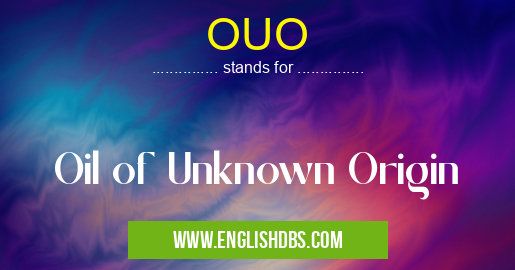What does OUO mean in UNCLASSIFIED
OUO is an abbreviation that stands for Oil of Unknown Origin. It is commonly used in the context of spill response and environmental cleanup. OUO refers to oil or petroleum products that have been released into the environment and whose source is unknown.

OUO meaning in Unclassified in Miscellaneous
OUO mostly used in an acronym Unclassified in Category Miscellaneous that means Oil of Unknown Origin
Shorthand: OUO,
Full Form: Oil of Unknown Origin
For more information of "Oil of Unknown Origin", see the section below.
Characteristics of OUO
- Unknown Source: The source of OUO is unidentified, making it difficult to determine its composition and potential hazards.
- Varied Composition: OUO can come from various sources, including crude oil, refined products, and waste oils. Its composition can vary significantly, affecting its physical and chemical properties.
- Environmental Impact: OUO can have adverse effects on the environment, including contamination of soil, water, and air. It can also harm wildlife and human health.
Response and Cleanup
- Identification: Identifying the source of OUO is crucial for developing an effective response and cleanup strategy. This can involve sample collection and analysis.
- Containment and Removal: Containment measures, such as booms or barriers, may be deployed to prevent the spread of OUO. Removal methods include skimming, pumping, and bioremediation.
- Environmental Monitoring: Regular monitoring is essential to track the extent of contamination and evaluate the effectiveness of cleanup efforts.
Essential Questions and Answers on Oil of Unknown Origin in "MISCELLANEOUS»UNFILED"
What is Oil of Unknown Origin (OUO)?
OUO refers to crude oil or refined petroleum products that cannot be identified or traced to a specific source. It often arises from illegal activities, such as oil theft or smuggling.
Why is OUO a problem?
OUO poses significant environmental and economic risks:
- Environmental: It can contaminate soil and water, harming ecosystems and human health.
- Economic: It undermines legitimate oil industries and deprives governments of revenue.
How is OUO detected?
Various methods are used to detect OUO, including:
- Chemical analysis: Comparing its composition to known crude oil sources.
- Isotope analysis: Measuring the ratios of stable isotopes to identify its origin.
- Satellite imagery: Monitoring oil spills and illegal shipping routes.
What are the consequences of dealing with OUO?
Involvement in OUO can lead to:
- Legal penalties: Fines, imprisonment, or seizure of assets.
- Environmental damage: Liability for cleanup costs and remediation.
- Reputational damage: Negative publicity and loss of trust.
What can be done to prevent OUO?
Collaborative efforts are crucial:
- Strengthen regulations and enforcement: Implement strict laws and penalties against illegal oil activities.
- Improve transparency: Establish systems for tracking oil production and distribution.
- Promote sustainable practices: Support ethical oil extraction and encourage renewable energy sources.
Final Words: OUO represents a significant environmental concern due to its unknown origin and potential hazards. Effective response and cleanup require prompt identification, containment, removal, and monitoring. Understanding the nature and impact of OUO is crucial for minimizing its environmental consequences and ensuring the safety of ecosystems and human health.
